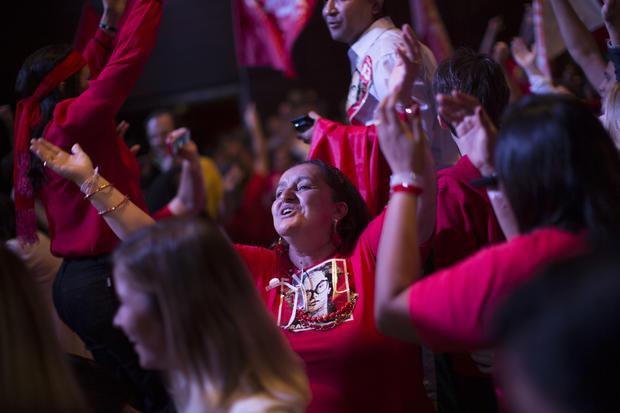Brazilian President wins new term in office
RIO DE JANEIRO - Brazil's left-leaning President Dilma Rousseff was re-elected Sunday in the tightest race the nation has seen since its return to democracy three decades ago, after a bitter campaign that divided Brazilians like no other before it.
With 99 percent of the vote counted, Rousseff had 51.5 percent of the ballots, topping center-right challenger Aecio Neves with 48.5 percent.
Rousseff's victory extends the rule of the Workers' Party, which has held the presidency since 2003. During that time, they've enacted expansive social programs that have helped pull millions of Brazilians out of poverty and into the middle class
The choice between Rousseff and Neves split Brazilians into two camps - those who thought only the president would continue to protect the poor and advance social inclusion versus those who were certain that only the contender's market-friendly economic policies could see Brazil return to solid growth.
The Workers' Party's time in power has seen a profound transformation in Brazil. But four straight years of weak economic growth under Rousseff, with an economy that's now in a technical recession, has some worried those gains are under threat.
"Brazilians want it all. They are worried about the economy being sluggish and stagnant but they want to preserve social gains that have been made," said Michael Shifter, president of the Washington-based Inter-American Dialogue. "The question is which candidate is best equipped to deliver both of those."
Rousseff and Neves have fought bitterly to convince voters that they can deliver on both growth and social advances. This year's campaign is widely considered the most acrimonious since Brazil's return to democracy in 1985, a battle between the only two parties to have held the presidency since 1995.
Neves has hammered at Rousseff over a widening kickback scandal at state-run oil company Petrobras, with an informant telling investigators that the Workers' Party directly benefited from the scheme.
Rousseff rejected those allegations and told Brazilians that a vote for Neves would be support for returning Brazil to times of intense economic turbulence, hyperinflation and high unemployment, which the nation encountered when the Social Democrats last held power.
"We've worked so hard to better the lives of the people, and we won't let anything in this world, not even in this crisis nor all the pessimism, take away what they've conquered," Rousseff said before voting in southern Brazil.
In Rio de Janeiro, 43-year-old lifeguard Marcelo Barbosa dos Santos voted in the Botafogo neighborhood and said he's been a Rousseff backer from the beginning.
"Many things changed for the better during Dilma's administration," he said. "The poor have seen our lives improved and we want that to continue."
But Paula Canongia, a 34-year-old hotel owner, said she voted for Neves because of "the current state of our country."
"He's not an ideal candidate, far from it ... but we desperately need change and hopefully he can provide that," she said.
Officials from Brazil's top electoral court said voting went smoothly through late afternoon. However, there was a shooting at a polling location in the northeastern state of Rio Grande do Norte, when a man was shot and killed inside a school where ballots were cast. Police said it appeared to be gang-related.
